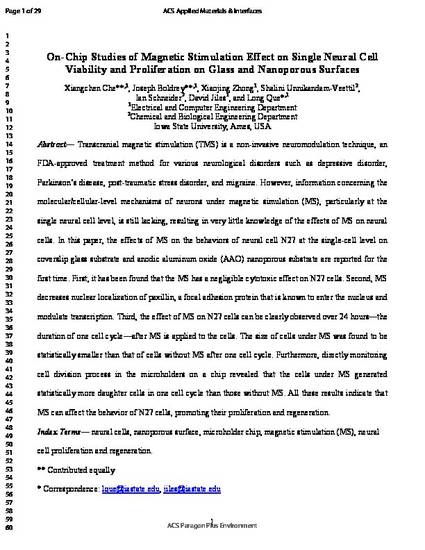
Transcranial magnetic stimulation (TMS) is a non-invasive neuromodulation technique, an FDA-approved treatment method for various neurological disorders such as depressive disorder, Parkinson’s disease, post-traumatic stress disorder, and migraine. However, information concerning the molecular/cellular-level mechanisms of neurons under magnetic simulation (MS), particularly at the single neural cell level, is still lacking, resulting in very little knowledge of the effects of MS on neural cells. In this paper, the effects of MS on the behaviors of neural cell N27 at the single-cell level on coverslip glass substrate and anodic aluminum oxide (AAO) nanoporous substrate are reported for the first time. First, it has been found that the MS has a negligible cytotoxic effect on N27 cells. Second, MS decreases nuclear localization of paxillin, a focal adhesion protein that is known to enter the nucleus and modulate transcription. Third, the effect of MS on N27 cells can be clearly observed over 24 hours—the duration of one cell cycle—after MS is applied to the cells. The size of cells under MS was found to be statistically smaller than that of cells without MS after one cell cycle. Furthermore, directly monitoring cell division process in the microholders on a chip revealed that the cells under MS generated statistically more daughter cells in one cell cycle than those without MS. All these results indicate that MS can affect the behavior of N27 cells, promoting their proliferation and regeneration.
Available at: http://works.bepress.com/ian_schneider/20/

This is a manuscript of an article published as Che, Xiangchen, Joseph Boldrey, Xiaojing Zhong, Shalini Unnikandam-Veettil, Ian Christopher Schneider, David Jiles, and Long Que. "On-Chip Studies of Magnetic Stimulation Effect on Single Neural Cell Viability and Proliferation on Glass and Nanoporous Surfaces." ACS Applied Materials & Interfaces 10, no. 34 (2018): 28269-28278. DOI: 10.1021/acsami.8b05715. Posted with permission.